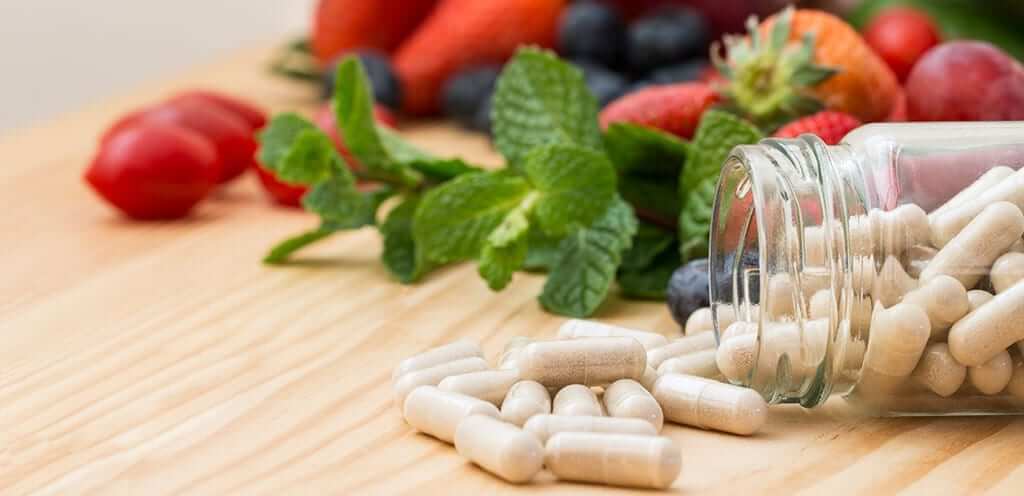A well-balanced diet of simple, whole foods is one of the cornerstones of an effective diabetes management plan. Supplements should never be considered the “magic bullet” in trying to control your diabetes. Your focus should include a solid eating plan, elevating your activity level, incorporating stress management, getting proper nightly sleep and taking your diabetes medications as prescribed. More than 50% of people with diabetes are currently using supplements and not all of them discuss this with their health care provider. This may cause additional health problems. Using diabetes-friendly supplements may also make a difference in your blood sugars and overall wellness when taken correctly.
Certain supplements may help reduce insulin resistance or the body’s inability to use insulin. Other supplements may aid in improved food absorption and digestion. Remember, supplements are not presently regulated and there is still no research on long-term safety. Not all supplements work the same way for all individuals as different medications may interact with supplements and some individuals can develop unpleasant side effects. Always talk to your health care provider before starting any supplements especially when you have diabetes. Consider adding these supplements to your daily routine with the approval of your physician:
Common Dietary Supplements for people with diabetes
Chromium
There is still controversy about chromium and diabetes and a lack of research remains. Chromium is a trace mineral that may be helpful for people with diabetes. When there is a lack of chromium in your diet, the body cannot efficiently use glucose. Whole grains, broccoli, pumpkin seeds, and oranges are all-natural sources of chromium. It can also be taken as a dietary supplement to strengthen bones and muscles and help reduce blood pressure. Multiple GI effects can be seen with too much chromium including vomiting, diarrhea, GI bleeding and when taken in high doses and could affect kidney function. There is no established dose, but the research suggests 50-200mcg daily and the older your age, the higher the dose in that range.
Magnesium
Studies have shown that a magnesium deficiency may boost your risk of developing diabetes since low levels can affect the body’s ability to use insulin. Magnesium helps in bone, heart and muscle function and may reduce insulin resistance. Magnesium also helps transport calcium and potassium to the other cells. Many people are low in magnesium especially if they take diuretics to decrease their blood pressure. Magnesium is contained in foods such as nuts, seeds, green, leafy vegetables and a variety of whole grains. Taking the correct dose is important, as too much may be detrimental. Side effects include stomach discomfort, diarrhea and a possible irregular heartbeat. The recommended dose should be between 300-400 mg daily.
Omega-3‘s
Since heart disease is the leading cause of death in those with diabetes, taking supplements to reduce heart issues can be beneficial. Omega 3’s help lower inflammation and plaque formation in arteries which is a major cause of heart attacks and strokes. Omega-3’s also lower triglyceride levels which is a constant challenge for people with diabetes. Triglycerides should be below 150 mg/dl and can be as high as 800mg/dl when diabetes is uncontrolled. Omega-3’s is found in fish such as salmon, sardines, anchovies, mackerel, trout, herring, and tuna, and in shellfish such as oysters and crab. If you do not eat fish, you can find Omega 3’s in walnuts and wheat germ. Omega-3s can act as a blood thinner and may be contraindicated for those on aspirin, anti-inflammatories and blood thinner drugs including Xarelto, Pradaxa, Eliquis, Plavix or Coumadin. When taking this supplement make sure it offers both EPA and DHA. Purchase them in capsules, store them in the refrigerator to reduce the fishy taste and problem of gastric “repeating.” Supplement doses vary between 1000-4000mg per day but always consult with your health care provider.
Vitamin D

Coq10 (ubiquinol)
Most people with diabetes take a statin medication such as Crestor, Lipitor, Zocor for elevated LDL levels of cholesterol. Our bodies make Coq10 naturally, which becomes depleted from taking statins. Coq10 helps cells make energy and has an anti-oxidant effect. To supplement, you may consider 100-200mg daily with your statin if approved by your MD. Coq10 can interact with blood thinners, so be aware.
Garlic
Garlic is an herb used as a flavor enhancer for foods but has medicinal properties as well. It is related to onions, leeks and shallots. “Allicin”, gives the odor and taste to garlic, which is a sulfur compound with all the benefits. It is low in calories and high in vitamin C, B6 and manganese. It has been used in ancient civilizations for over 5000 years for the blood system and heart issues. Garlic has been known to reduce blood pressure and LDL levels of cholesterol. Garlic can be crushed, grated, sliced, chopped or chewed for the best health benefits. It can be used fresh, as garlic powder or garlic oil. There is controversy suggesting that raw garlic may offer more benefits than cooked garlic, but many people can’t tolerate it raw. Those people should try eating cooked garlic or take enteric-coated garlic pills which will dissolve in the intestines and not the stomach. This supplement form offers the least side effects related to the taste and smell of garlic. Not all garlic supplements are created equal, so read the label and ask questions when purchasing. Garlic can interfere with blood thinners and certain HIV drugs so alert your doctor if you choose to take garlic. A recommended dose in the literature is 200mg -2-3 times a day with meals.
Alpha-Lipoic Acid (ALA)
ALA is an antioxidant that occurs naturally in the body. Not much research has been done on ALA supplements especially in the long term. Studies have shown that ALA can prevent cell damage and aid in glucose uptake in the muscle which could help people with type 2 diabetes use insulin more efficiently. People with diabetes may suffer from hypoglycemia or low blood sugar when taking ALA supplements especially if also taking insulin or sulfonylureas. Although food sources do not seem to boost free ALA levels, ALA is found in spinach, peas, beets, carrots, tomatoes, potatoes, Brussel sprouts and broccoli – all foods worth eating. ALA may also blunt the pain in the nerves caused by neuropathy. It generally works better in the early stages of neuropathy and has little effect on tingling and numbness. It may cause skin rashes and stomach upset in some people and can interact with antacids. There are no specific recommended doses, but the studies show, “600-1200mg daily may help diabetes and neuropathy.”
Ginseng
Although many people use red ginseng supplements for their diabetes treatment since it “supposedly has an impact on blood sugars,” the most recent research is pointing against that theory. The Chinese have used red ginseng for thousands of years and state, “it influences diabetes and can decrease insulin resistance.” There are no supplement guidelines at this point.
Cinnamon
Cinnamon is a spice that is cheap, plentiful and has been around for thousands of years. It is harvested from the inner bark of a tropical, evergreen plant. The oily part of the tree contains antioxidants called polyphenols which helps decrease inflammation. According to studies, “Hydroxychalcone, a compound in cinnamon, can stimulate insulin receptors.” It may slow the breakdown of carbohydrate foods as well. It can lower LDL’s, triglycerides and may even raise HDL levels (the good kind) of cholesterol. Put ground cinnamon in yogurt, cereal or coffee to get some benefits but remember, it will not replace other methods of approved blood sugar control. It can be used in conjunction. Although there is no established guidelines or specific recommended amount, a serving for the day would be ½ -1 teaspoon of ground cinnamon. Some people use as much as between 1-6 grams of cinnamon a day which, “may be toxic to the liver.” There are two types of cinnamon available. Ceylon, is the milder form, more expensive and grown in Sri Lanka and can be found in health food stores and on line. The more common form is Cassia which is grown in China and Indonesia and is cheaper, but may cause liver damage when eaten in large quantities.
Psyllium Supplements
Psyllium is a form of soluble fiber which may curb the rise in blood sugar after a meal. “Psyllium forms a gel which can slow the digestion of food and help with blood sugars.” It promotes regularity and is considered a pre-biotic. A “pre-biotic is a substance needed for healthy colonies of probiotics to grow in the gut and keep you healthy.” Psyllium comes in powder, wafer, granules and capsule form. It has no taste, if unflavored, and can be added to cold cereal, oatmeal, toast, yogurt or almost any other food. The powder or granule form can be added to a glass of water. It can help with weight loss since it swells with water and keeps you more satiated. Psyllium can reduce systemic inflammation, lower cholesterol and reduce rates of infection. Start taking psyllium slowly and drink plenty of water since it may cause flatulence and bloating at the beginning. There are no specific guidelines, but read labels since it is tolerated on an individual basis.
Diabetes-friendly dietary supplements may help you maintain better blood sugar control along with good lifestyle habits and proper medical care. They can be powerful, cause side effects and drug interactions and should be used with knowledge. Consult with your health care provider to see how supplements may fit into your overall diabetes management plan but never discontinue your regular routine for diabetes.
Have a question or comment? Then post below, no registration required. I would love to hear from you!
NOTE: Consult your Doctor first to make sure my recommendations fit your special health needs.







Leave A Comment